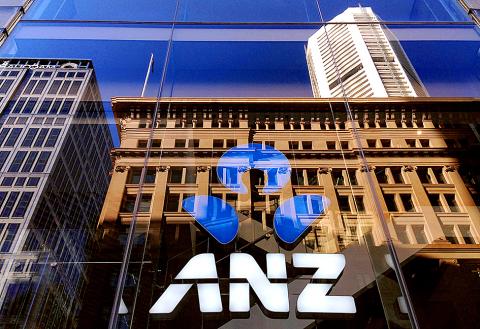Australia & New Zealand Banking Group Ltd (ANZ) is to face criminal cartel charges over a multibillion-dollar capital raising, along with its advisers Deutsche Bank AG and Citigroup Inc, regulators said yesterday.
The charges, to be laid by federal prosecutors, come at a torrid time for Australia’s major lenders as a royal commission probes misconduct in the finance industry.
ANZ in 2015 raised A$2.5 billion (US$1.9 billion) from institutional investors and up to A$500 million from retail investors to help meet the cost of tougher regulatory requirements, but the Australian Competition and Consumer Commission (ACCC) claimed after an investigation that there were “cartel arrangements relating to trading in ANZ shares” following the share placement.

Photo: Reuters
Prosecutors allege there was “an arrangement or understanding allegedly made” by the joint lead managers of the bank’s institutional equity placement of 80.8 million shares in August 2015, ANZ said.
ANZ, its group treasurer Rick Moscati, the share placement’s underwriters Deutsche Bank and Citigroup, and a number of other individuals are to be charged over the alleged criminal cartel conduct, the ACCC said.
“It will be alleged that ANZ and the individuals were knowingly concerned in some or all of the conduct,” ACCC chairman Rod Sims said in a statement.
According to the ACCC, cartel conduct occurs when businesses act together, instead of competing against each other, to drive up the profit of cartel members.
There was no immediate comment from the Commonwealth Director of Public Prosecutions, which is taking the case to court.
ANZ shares closed 1.51 percent lower at A$26.80 in Sydney trading yesterday.
ANZ chief risk officer Kevin Corbally said the company “acted in accordance with the law in relation to the placement and on that basis the bank intends to defend both the company and our employee.”
Citigroup said it would “vigorously defend” the allegations, adding that the case involved an area of financial markets activity not previously considered by Australian courts or regulatory guidance.
“This is a highly technical area and if the ACCC believes there are matters to address, these should be clarified by law or regulation or consultation,” Citigroup added in a statement.
ANZ said it was also cooperating with an investigation by the Australian Securities and Investments Commission into whether the bank should have disclosed the joint lead managers took up 25.5 million shares of the placement.
University of Sydney banking expert Andrew Grant said ACCC cases are usually prosecuted via civil rather than criminal action.
“Resorting to criminal charges against the ANZ and others would suggest that the authorities feel that they have a particularly strong case,” Grant said.

SEEKING CLARITY: Washington should not adopt measures that create uncertainties for ‘existing semiconductor investments,’ TSMC said referring to its US$165 billion in the US Taiwan Semiconductor Manufacturing Co (TSMC, 台積電) told the US that any future tariffs on Taiwanese semiconductors could reduce demand for chips and derail its pledge to increase its investment in Arizona. “New import restrictions could jeopardize current US leadership in the competitive technology industry and create uncertainties for many committed semiconductor capital projects in the US, including TSMC Arizona’s significant investment plan in Phoenix,” the chipmaker wrote in a letter to the US Department of Commerce. TSMC issued the warning in response to a solicitation for comments by the department on a possible tariff on semiconductor imports by US President Donald Trump’s

The government has launched a three-pronged strategy to attract local and international talent, aiming to position Taiwan as a new global hub following Nvidia Corp’s announcement that it has chosen Taipei as the site of its Taiwan headquarters. Nvidia cofounder and CEO Jensen Huang (黃仁勳) on Monday last week announced during his keynote speech at the Computex trade show in Taipei that the Nvidia Constellation, the company’s planned Taiwan headquarters, would be located in the Beitou-Shilin Technology Park (北投士林科技園區) in Taipei. Huang’s decision to establish a base in Taiwan is “primarily due to Taiwan’s talent pool and its strength in the semiconductor

Industrial production expanded 22.31 percent annually last month to 107.51, as increases in demand for high-performance computing (HPC) and artificial intelligence (AI) applications drove demand for locally-made chips and components. The manufacturing production index climbed 23.68 percent year-on-year to 108.37, marking the 14th consecutive month of increase, the Ministry of Economic Affairs said. In the first four months of this year, industrial and manufacturing production indices expanded 14.31 percent and 15.22 percent year-on-year, ministry data showed. The growth momentum is to extend into this month, with the manufacturing production index expected to rise between 11 percent and 15.1 percent annually, Department of Statistics

An earnings report from semiconductor giant and artificial intelligence (AI) bellwether Nvidia Corp takes center stage for Wall Street this week, as stocks hit a speed bump of worries over US federal deficits driving up Treasury yields. US equities pulled back last week after a torrid rally, as investors turned their attention to tax and spending legislation poised to swell the US government’s US$36 trillion in debt. Long-dated US Treasury yields rose amid the fiscal worries, with the 30-year yield topping 5 percent and hitting its highest level since late 2023. Stocks were dealt another blow on Friday when US President Donald